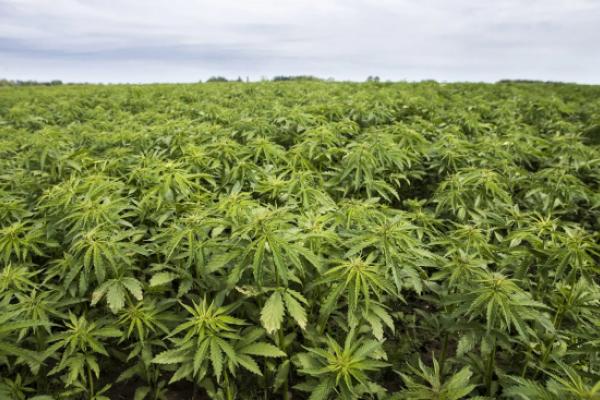Hemp can be crucial in controlling climate change and it is destined to be extremely profitable, win-win?
A team of scientists from Hudson Carbon, an upstate New York research center that studies carbon storage, says cannabis may be the missing player in the humanity's fight against climate change. How? Hemp absorbs carbon dioxide from the atmosphere more than twice as efficiently as trees.
Although the United States is only about 5% of the world's population, it is responsible for 28% of global carbon emissions, so it behooves us to take note.
"Basically, if [the United States] grew 50 million acres of hemp, we would be sequestering a few hundred million tons of carbon per year on that acreage," Ben said. Dobson, founder and president of Hudson Carbon.
Dobson is considered a pioneer in the field of carbon farming. His farm in New York's Hudson Valley is a soil lab where researchers have found that while trees can capture about six tons of CO2 per year, hemp can suck up to 16 tons. CO2 also becomes permanently locked in hemp fibers, which can be used as a raw material to make a wide variety of products, from textiles and construction to automotive parts and medicines.
When you consider cotton alone, which accounts for 43% of all fibers used for clothing and textiles globally, hemp can offer tremendous benefits given the large difference in water needed to grow hemp compared to cotton.
Hemp, or industrial hemp, is a subspecies of the cannabis plant but lacks most of the psychoactive compound tetrahydrocannabinol (THC) in marijuana.
Fastest growing plant on EarthAnother advantage of hemp is the fact that it is one of the fastest growing plants in the world, reaching four meters in height in just 100 days.< /p>
In addition to purifying the air of greenhouse gases, cannabis plants can also absorb carcinogenic heavy metals such as mercury, lead or cadmium from soil - elements which, although they are suitable for crops for food use, are very dangerous for people who consume these plants.
And hemp is destined to be extremely profitableIndustrial sales are expected to triple over the next 7 years, from $4.71 billion in 2019 to $15.26 billion in 2027.
The work Dobson is currently doing could allow farmers to be paid for their practices and their ability to sequester carbon.
Farmers, after all, are collectively responsible for 60% of the Earth's surface and how it is treated, according to Dobson.
"We really manage and manage more than half of the Earth's surface," he said. "We must regenerate this land surface into a healthy ecosystem to secure a future for our children and mitigate the worst effects of climate change."
We wonder... what are we waiting for?
© 2022 Benzinga.com. Benzinga does not provide investment advice. All rights reserved.

A team of scientists from Hudson Carbon, an upstate New York research center that studies carbon storage, says cannabis may be the missing player in the humanity's fight against climate change. How? Hemp absorbs carbon dioxide from the atmosphere more than twice as efficiently as trees.
Although the United States is only about 5% of the world's population, it is responsible for 28% of global carbon emissions, so it behooves us to take note.
"Basically, if [the United States] grew 50 million acres of hemp, we would be sequestering a few hundred million tons of carbon per year on that acreage," Ben said. Dobson, founder and president of Hudson Carbon.
Dobson is considered a pioneer in the field of carbon farming. His farm in New York's Hudson Valley is a soil lab where researchers have found that while trees can capture about six tons of CO2 per year, hemp can suck up to 16 tons. CO2 also becomes permanently locked in hemp fibers, which can be used as a raw material to make a wide variety of products, from textiles and construction to automotive parts and medicines.
When you consider cotton alone, which accounts for 43% of all fibers used for clothing and textiles globally, hemp can offer tremendous benefits given the large difference in water needed to grow hemp compared to cotton.
Hemp, or industrial hemp, is a subspecies of the cannabis plant but lacks most of the psychoactive compound tetrahydrocannabinol (THC) in marijuana.
Fastest growing plant on EarthAnother advantage of hemp is the fact that it is one of the fastest growing plants in the world, reaching four meters in height in just 100 days.< /p>
In addition to purifying the air of greenhouse gases, cannabis plants can also absorb carcinogenic heavy metals such as mercury, lead or cadmium from soil - elements which, although they are suitable for crops for food use, are very dangerous for people who consume these plants.
And hemp is destined to be extremely profitableIndustrial sales are expected to triple over the next 7 years, from $4.71 billion in 2019 to $15.26 billion in 2027.
The work Dobson is currently doing could allow farmers to be paid for their practices and their ability to sequester carbon.
Farmers, after all, are collectively responsible for 60% of the Earth's surface and how it is treated, according to Dobson.
"We really manage and manage more than half of the Earth's surface," he said. "We must regenerate this land surface into a healthy ecosystem to secure a future for our children and mitigate the worst effects of climate change."
We wonder... what are we waiting for?
© 2022 Benzinga.com. Benzinga does not provide investment advice. All rights reserved.
What's Your Reaction?






















